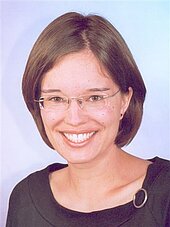Kehrel, Silvia
Congratulations on passing the viva voce examination
on 13 September 2011.
Dissertation topic:
"'Possibilities of thinking childhood': Representations of childhood and their ideal reception in the Middle High German Passional."
Scholarship according to the Bayerisches Eliteförderungsgesetz (1 November 2007 - 30 April 2010).
First supervisor: Prof. Dr Trude Ehlert
Second supervisor:
Class in the Graduate School: "Middle Ages and Renaissance"
Doctorate in the Graduate School since winter semester 2007/2008.
Abstract:
My dissertation contributes to the study of childhood in the Middle Ages. At the centre of the research is the Passional (c. 1300), one of the first known Middle High German verse legends; in addition, two of its sources are used for comparative purposes: The Legenda aurea by Jacobus de Voragine and the Childhood of Jesus by Konrad von Fussesbrunnen. On the basis of selected passages from the first and third books of the Passional, the work examines which knowledge about, which patterns of interpretation and ideas of, which values, norms and attitudes in relation to childhood permeate and intersect each other in the ideal reception of these texts and thus form a specific set of 'ways of thinking childhood'.
This is done with the help of a detailed set of analytical tools, which is developed in the first part of the thesis and - based on a combination of cultural, literary and cognitive approaches - theoretically substantiated. On the one hand, it serves to show the thought and value schemata explicated by the texts; on the other hand, it enables conclusions to be drawn about non-explicated schemata that are 'required' by the text structures. Of particular interest here are the breaks that can be observed in relation to the valid text and textualisation rules: The 'breaking in' thought schemata can be described as particularly 'assertive' or 'dominant' in the ideal reception process. In the second main part of the work, the analytical tools developed are applied to selected passages of the Passional that contain depictions of childhood. It is shown time and again that it is precisely values that are assigned to the 'worldly' realm of the textual world that are accorded unexpectedly great importance in the ideal reception of the Passiontal. In this respect, the Passional is reminiscent of texts from courtly literature from around 1300. In the ideal reception process of the Passional, the relevant structures therefore make it possible to grasp the texts with the help of the prior knowledge that is also necessary for the reception of courtly literature - with its more 'worldly' location in life. On this basis, a connection between the ideal reception of the Passional and its historically real reception in the Teutonic Order can be explored. Finally, the last chapter of the thesis uses an example (Hartmann von Aue: Der arme Heinrich) to demonstrate the transferability of the developed methodology to medieval narrative texts outside the Passional.






